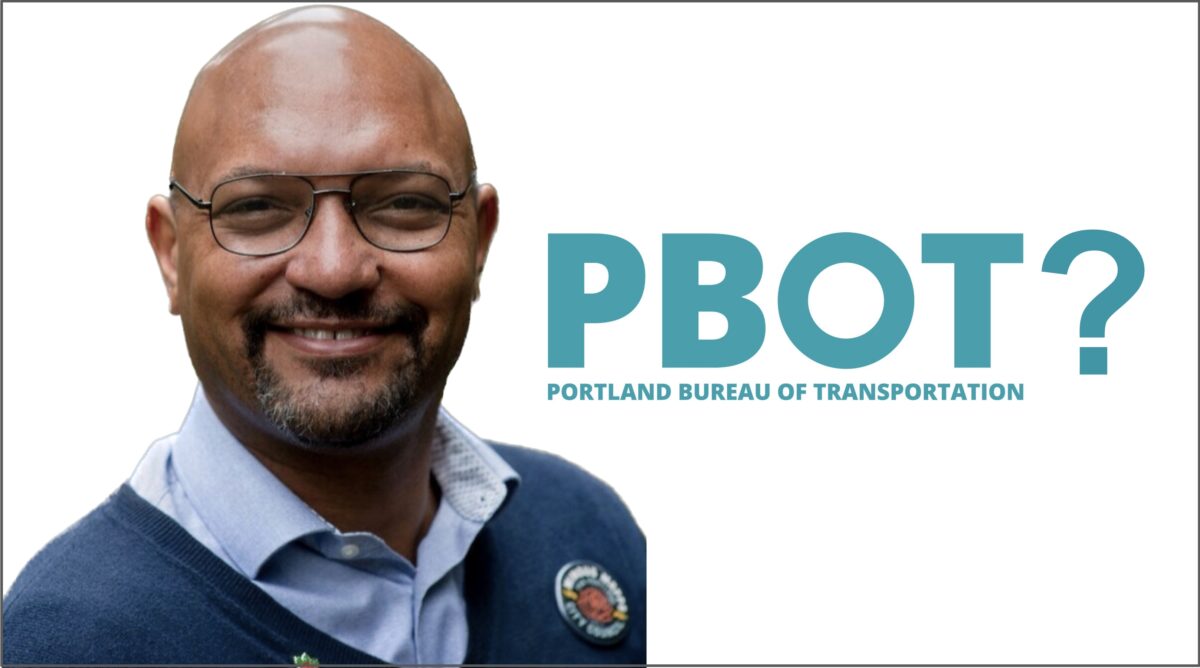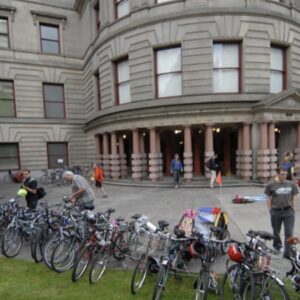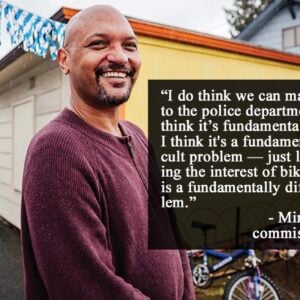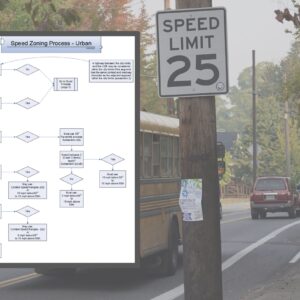After last night’s political earthquake, one of the many questions we are curious about is: Which city commissioner will oversee the bureau of transportation?
Commissioner Jo Ann Hardesty has been in charge of PBOT since January 2020 when Mayor Ted Wheeler plopped the responsibility on her lap despite her showing no prior interest in managing the 800 person, $570 million bureau. Given that PBOT is considered one of the most intractable bureaus, giving it to a newcomer like Rene Gonzalez, who beat Hardesty in a decisive victory last night, is not likely.
The way Portland’s government works now, the mayor has sole discretion to assign bureaus to himself and the other four city commissioners. In a “weak mayor” system, it’s one of the position’s major sources of power. But with the passage of charter reform last night, that’s all set to change.
So Mayor Ted Wheeler will not wait until the reforms go into effect in 2024. According to a statement he made just a few minutes ago, Wheeler will start to shake things up right away. When it comes to bureau assignments, he said today that, “I will start knocking down the dysfunctional siloed bureaus that are a plague of our outdated commission form of city government.”
More specifically, he plans to group bureaus by “service area.” That’s a term the city doesn’t really use anymore, but it refers to a way bureaus were traditionally organized together. The five service areas (one for each commissioner) are: Public Safety; Public Utilities; Legislative, Administrative, and Support; Parks, Recreation and Culture; and Transportation and Parking. Over the years, those categories have disappeared (even stickers that referenced them have been removed from the city hall office doors) as the number of bureaus has expanded and they were assigned to achieve political instead of administrative goals.
Now service areas are coming back thanks to charter reform. Here’s how a city hall insider explained it to me this morning:
“There’s an implicit working assumption in the mayor’s office that the city administrator [a new position coming in 2024 that will oversee all bureaus] will have deputies on their staff, like assistant city managers, that will each have a portfolio,” the person shared. And those portfolios would be based on the five service areas.
This sounds good in theory, but it’s more complicated in practice.
There are currently 23 bureaus split between the mayor and four commissioners, and not all of them fit neatly into a service area. So decisions will have to be made not just how each bureau is categorized but who gets put in charge of it. Workload also complicates things. It might make sense from a policy perspective to put the bureaus of water, environmental services, and transportation into one service area — but no one commissioner can handle the demands of all three.
Which brings us back to who will be in charge of transportation come January.
My money is on Commissioner Mingus Mapps.
When I interviewed Mapps two years ago, he had a lot to say about the topic. I’ve also heard he lobbied to get PBOT when he first took office in 2021. Since then, there have been rumors that Mapps wants to be mayor. His deep bench of wealthy backers and his plan (now scrapped) to counter the charter reform proposal with one that would have a stronger mayor, have only furthered that perception.
One city hall source I spoke to today said their money is also on Mapps as PBOT commissioner. “Mapps should get the assignment. He wants to be mayor. And I think anybody who wants to be mayor should be tasked with a complex bureau.”
If he does get the assignment, sources say his current senior policy advisory, Shannon Carney, would be PBOT liaison. Carney’s resume includes a stint at transit agency King County Metro in Seattle, where she managed a marketing program that aimed to get people out of cars.
What type of PBOT leader would Mapps be? That’s hard to say. Stay tuned as we try to figure this all out.
UPDATE, 11/1: Willamette Week has shared the latest info from City Hall about how each bureau might be clustered. According to their story, the transportation bureau would be in the “Utilities” service area along with the water and environmental services bureaus.








Thanks for reading.
BikePortland has served this community with independent community journalism since 2005. We rely on subscriptions from readers like you to survive. Your financial support is vital in keeping this valuable resource alive and well.
Please subscribe today to strengthen and expand our work.
I’d personally put my money on Wheeler retaining PBOT and appointing Sam Adams as “Assistant City Manager” of transportation, as part of a 2-year “transition period”, then getting the new 12-member city council to appoint Adams as the city manager or City Administrator or whatever the appointed position will get called in 2024/5. When Adams was mayor he retained both PBOT and Planning.
“City Manager” is a professional position that is supposed to be a qualified person who most likely has city manager experience at smaller cities before graduating to a bigger city like Portland. I certainly hope it doesn’t become a political appointee situation. There should be clear qualifications required, and people should have to apply for it like any other City job.
Aww, look at Ted pretending he’s a competent administrator instead of an empty suit who is no longer viable for Governor
Just want to note that when Mapps was running for City Council he gave a truly awful interview to (if I remember right) the Willamette Week where he complained that with so much more housing density coming to his Buckman neighborhood around 20th & Burnside he could no longer reliably park right in front of his house. It doesn’t bode well if the transportation commissioner thinks it’s the city’s responsibility to guarantee on-street parking in front of everybody’s house. Not to mention the implied anti-housing-density message in there.
Can you find a source on that?
https://www.wweek.com/news/city/2019/09/21/mingus-mapps-used-to-work-in-commissioner-chloe-eudalys-bureau-now-he-aims-to-unseat-her/
You support infill development. Would you vote for the proposal as it’s currently before the City Council?
I’d have to take a closer look at the proposal. In general, density is a good policy. A thing that makes communities vibrant is that they’re walkable. It’s much easier from an infrastructure point of view. [But] you can have too much density. Think about Burnside on the eastside up to at least 20th. I’ve lived in that neighborhood for a long time. Two or three years ago, you could just park in that neighborhood. I could park in front of my house. Some of our Portland neighborhoods are becoming a little dysfunctional because we’ve packed too much into too small of a space.
Yep, just found it: https://www.wweek.com/news/city/2019/09/21/mingus-mapps-used-to-work-in-commissioner-chloe-eudalys-bureau-now-he-aims-to-unseat-her/
Maps won my respect last week when Hardesty called him “asshole” on a hot mic.
Of course he was right: we need to move away from “aspirational” policy and towards ideas that work.
Hardesty spent 3.8 years doing everything but running her bureaus.
Her bureaus were PBOT and PFD. How is she solely responsible for anything but that?
Perhaps you were thinking of Ted Wheeler in charge of PPB, or Dan Ryan in charge of homeless services and housing bureau.
My money is on the mayor keeping it. First, Sam and Tom Miller are in there and would certainly love another stint as the heads of transportation. Second, a big focus is clearly going to be cleaning up trash, graffiti, and for better or worse moving/removing campsites. These “livability” issues largely take place in transportation right-of-way. So, by controlling PBOT, he would have direct control over the space he’s trying to control… woah, meta. That may also be a case for Dan Ryan to get it if Sam shares the huge problems he had when he was mayor and had both PBOT and police.
Hardesty like Eudaly before her needed to be shown the door and it felt good doing it. See ya JoAnn!